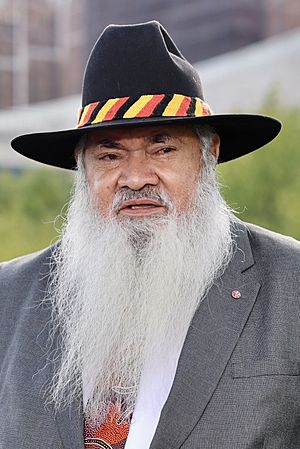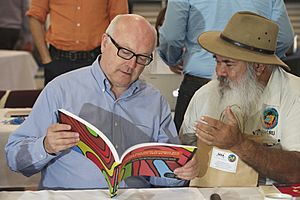Pat Dodson facts for kids
Quick facts for kids
Patrick Dodson
|
|
|---|---|

Dodson in New York City in 2022
|
|
| Senator for Western Australia | |
| In office 2 May 2016 – 26 January 2024 |
|
| Preceded by | Joe Bullock |
| Succeeded by | Varun Ghosh |
| Special Envoy for Reconciliation and Implementation of the Uluru Statement from the Heart | |
| In office 1 June 2022 – 26 January 2024 |
|
| Preceded by | (position established) |
| Succeeded by | (position terminated) |
| Personal details | |
| Born |
Patrick Lionel Djargun Dodson
29 January 1948 Broome, Western Australia, Australia |
| Political party | Labor |
| Children | 1 |
| Relatives | Mick Dodson (brother) |
| Alma mater | Corpus Christi College, Melbourne |
Patrick Lionel Djargun Dodson (born 29 January 1948) is an Australian Indigenous rights activist and former politician. He is often called the "father of reconciliation". This is because he worked hard to bring Aboriginal and Torres Strait Islander peoples and other Australians together.
He was a Senator for Western Australia from 2016 to 2024. He represented the Australian Labor Party (ALP). Patrick Dodson is the brother of Mick Dodson, who is also a well-known Indigenous leader.
Dodson is an Aboriginal elder from Broome, Western Australia. When he was younger, he became the first Aboriginal Australian Catholic priest. He also led the Council for Aboriginal Reconciliation. He was a Commissioner looking into Aboriginal deaths in custody. In 2008, he received the Sydney Peace Prize. He retired from the Senate in 2024 due to cancer treatment.
Contents
Early Life and Education
Patrick Lionel Djargun Dodson was born on 29 January 1948 in Broome. He was one of seven children. He is a Yawuru man, which is an Aboriginal language group from the Broome area.
His father, John "Snowy" Dodson, was born in Launceston, Tasmania. His mother, Patricia, was an Aboriginal Australian woman. His grandfather, Paddy Djiagween, was a leader of the Yawuru people. When Queen Elizabeth II visited Broome in 1963, young Patrick asked her: "Why can't we have the same rights as the white man?".
Dodson's family moved to Katherine, Northern Territory, when he was two years old. They moved to escape laws in Western Australia that banned mixed-race families. His father had even been imprisoned for living with an Aboriginal woman.
The Dodson children became orphans in 1960 when both parents died within three months. Patrick and his younger brother Mick, then 10, along with two other siblings, became "wards of the state". This meant the government became their legal guardian. Two Catholic priests helped the family. They arranged scholarships for Pat and Mick to study at Monivae College in Hamilton, Victoria. Pat was a very good student and became the head prefect in 1967. He was also captain of the Australian rules football team.
Career and Public Service
Catholic Priesthood
After school, Dodson studied to become a priest at Corpus Christi College, Melbourne. He was ordained in May 1975. He was the first Aboriginal person to become a Catholic priest in Australia. He left the priesthood in 1981. This was because of differences between Catholic beliefs and his Aboriginal spiritual beliefs. Dodson believed that many ancient Aboriginal traditions celebrated the same spiritual power as Christians.
Working for Indigenous Rights
Patrick Dodson has spent his life working on issues related to Indigenous rights and culture. He has advised governments, businesses, and community groups.
Some of his important roles include:
- Director of the Central Land Council in 1985. During this time, he helped return Uluṟu-Kata Tjuṯa National Park to its traditional owners, the Aṉangu people.
- A Commissioner from 1989. This commission investigated why so many Aboriginal people were dying in police custody.
- Director of the Kimberley Land Council in 1991.
- First chairman of the Council for Aboriginal Reconciliation (CAR) from 1991 to 1997. This group worked to improve relationships between Indigenous and non-Indigenous Australians. He resigned because he disagreed with new land rights laws.
- Founding chair of the Lingiari Foundation (2001–2016). This group supports Indigenous advocacy and research.
- Co-chair of an expert panel on the constitutional recognition of Aboriginal and Torres Strait Islander peoples (2010–2016). This panel looked at how to recognise Indigenous people in Australia's main law book.
- Member of the Australian National University Council in 2014. He was the first Aboriginal person on this council.
In 2020, Dodson was part of a parliamentary inquiry. This inquiry looked into the destruction of ancient caves at Juukan Gorge in the Pilbara region. These caves were very important to Aboriginal heritage.
Political Career
On 2 March 2016, Patrick Dodson was chosen to become a Labor senator for Western Australia. He filled a vacant seat after another senator resigned. He was sworn in as a senator on 2 May 2016. He kept his seat in the 2016 federal election. He served on several Senate committees. He was also a joint chair of a committee on constitutional recognition for Aboriginal and Torres Strait Islander Peoples.
In May 2016, Dodson joined the shadow ministry. This is a group of opposition politicians who would be ministers if their party won the election. He became the shadow assistant minister for Indigenous affairs. The Labor leader, Bill Shorten, promised Dodson would be the Minister for Indigenous Affairs if Labor won the 2019 election. However, Labor did not win.
After Labor won the 2022 federal election, Prime Minister Anthony Albanese appointed Dodson as Special Envoy for Reconciliation. He was also tasked with helping to put the Uluru Statement from the Heart into action. The Uluru Statement is a call for a Voice to Parliament, a truth-telling commission, and a treaty.
Due to illness, he could not fully participate in the campaign for the "Yes" vote in the 2023 Voice referendum. He was very disappointed when the "No" vote won. On 28 November 2023, he announced he would resign as a Senator on 26 January 2024. He said he could no longer serve due to cancer treatment.
After Retirement
In May 2025, Dodson appeared on the ABC Television program 7.30. He asked the Albanese government to continue working on the Uluru Statement. He called for a national truth-telling commission (called Makarrata) and a treaty. He also urged the government to set up regional assemblies.
Recognition and Awards
Patrick Dodson is often called the "father of reconciliation". This is because of his important work with the Council for Aboriginal Reconciliation. He always promoted respectful conversations between different groups in Australia.
In 1997, Dodson was named a National Living Treasure. His brother Mick also received this honour. They are the only siblings on the list.
In 2004, artist Zhou Xiaoping painted a portrait of Dodson. This painting is now in the National Portrait Gallery in Canberra.
Dodson has received several honorary degrees:
- An honorary Doctor of Laws degree from the University of Melbourne in 2006.
- An honorary professorship and an honorary Doctor of Letters degree from the University of New South Wales in 2012.
He was awarded the Sydney Peace Prize in 2008. In 2009, he received the John Curtin Medal from Curtin University.
Personal Life
Patrick Dodson has a daughter named Grace. Grace's mother is artist Annunciata Dartinga. Grace works as a nurse and is also an artist. Both live in Peppimenarti, Northern Territory.
In early 2023, Dodson was diagnosed with non-Hodgkin lymphoma, a type of cancer. He also had an infection and shingles. He received chemotherapy treatment. He returned from medical leave to support the "Yes" vote in the 2023 Australian Indigenous Voice referendum.
Images for kids
 | Chris Smalls |
 | Fred Hampton |
 | Ralph Abernathy |




